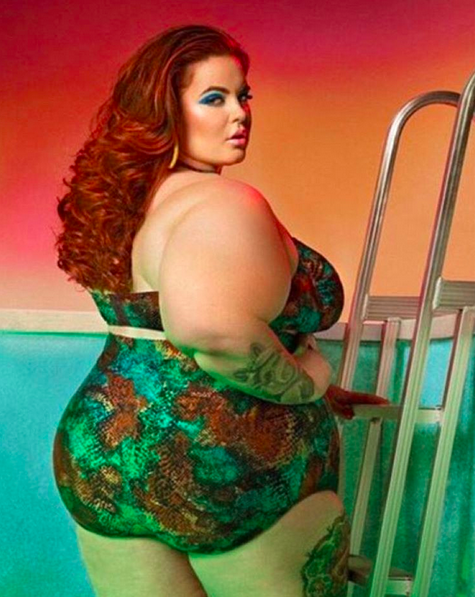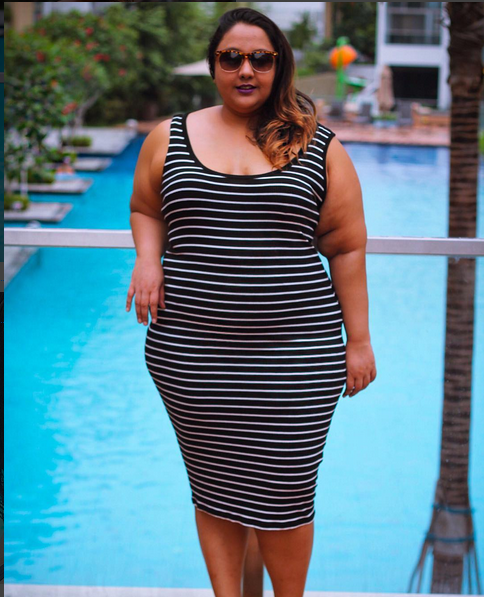Why Does the Internet Hate Plus-Size People?

Model Tess Holliday had a bikini photo of herself removed from Facebook. (Photo: Instagram)
For the second time in as many months, social media sites have removed images of plus-size women without notice or explanation. First, it was model Tess Holliday, beaming in a two-piece swimsuit on the feminist group Cherchez la Femme’s Facebook account in an ad to help promote its “Feminist and Fat” panel discussion in May. Then, this month, Instagram took down an image of Indian plus-size blogger Aarti Olivia Dubey, proudly posing with two of her plus-size pals. The trio were also wearing bikinis.
In both cases, representatives from the sites apologized for their “mistakes,” reinstating the photos (though Facebook backpedaled after originally claiming Holliday’s image “depicted a body … in an undesirable manner”). Both incidents have legions of body-positive people wondering, What gives?
It’s certainly not the bathing suits that violate Instagram’s terms, as the site is populated by a plethora of accounts featuring thinner scantily clad women — many wearing less than a bikini, in fact (we’re looking at you, Kim Kardashian).
Back in 2014, plus-size Instagram user Samm Newman reported that her entire account had been suspended after she posted a picture of herself embracing her figure in a bra and boy shorts. A message from the site informed her that she had violated Instagram’s community guidelines, which prohibit nudity and “mature content.” Again, the site restored the image and issued an apology — after Newman made the incident public, that is.

This plus-size blogger had her bikini photos removed from Instagram. (Photo: Instagram)
Fat-shaming on the Internet is certainly nothing new. It’s come to be expected from certain anonymous users. Just ask plus-size Ghanian woman Mzznaki Tetteh, whose engagement photos — in which she and her fiancé are fully dressed — were targeted by bullies after making their way to Instagram’s trending content page (Tetteh deleted any nasty comments, proudly keeping her happy photos posted for the world to see).
But when a social media platform intervenes to remove larger figures, it becomes an issue of censorship. In July 2015, Instagram quietly banned the hashtag #curvy, prompting vocal backlash — especially since it still allowed hashtags like #skinny and #thin. A week later, the site reinstated the hashtag and released a statement defending its right to remove hashtags that promote “inappropriate content” but conceding that #curvy is a term used in “positive ways, so we have decided to unblock the hashtag.”
On the flip side, social media sites have been used as platforms to proactively counter body-shaming. Last year, British singer Jamelia came under fire for comments indicating plus-size clothing should not be available in mainstream shops. Twitter users banded together to fight back, posting links to body-positive images using the hashtag #wearethey.
And, in a study last month, experts at VCU in conjunction with the Yale School of Medicine and American University analyzed almost 5,000 tweets containing the word fat. More than 56 percent were deemed “negative” and another 32 percent were “neutral.” The study found that body-shaming on Twitter can negatively impact the mental health of its users.
An older study by researchers ay the U.K.’s Durham University found that participants who were shown images of thin women preferred those figures — but when they were shown pictures of plus-size women, they were “significantly less keen” on thinner bodies. In a nutshell, people adapt to and become more accepting of all body types as long as they are exposed to a spectrum of them on social media.
It’s a phenomenon the researchers called “the power of exposure.” Public opinion aside, this principle is clearly one the powers that be at Instagram and Facebook might want to consider when deciding which images violate their terms of conduct. As it turns out, these photos may be doing just the opposite — inspiring people to be more inclusive.
Follow us on Instagram, Facebook, and Pinterest for nonstop inspiration delivered fresh to your feed, every day.

